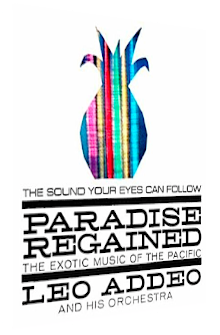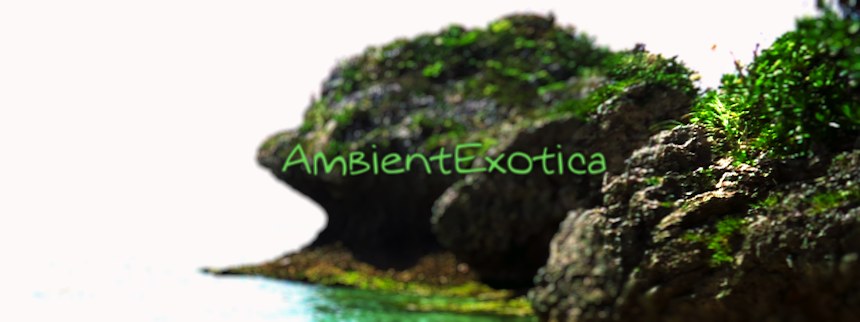
Leo Addeo
Paradise Regained
1961
For thousands of years, mankind suffered from a syndrome called Paradise Lost. Writer John Milton (1608–1674) and arranger Leo Addeo (1914–1979) try to rectify this situation with their respective works called Paradise Regained, the work of the latter gentleman being released in 1961 on RCA Victor, not coincidentally the record label which frequently relied on the Italian-American's arrangement skills. 12 renditions are featured on the album which merges Exotica with Space-Age and Hapa Haole. The first doubts of whether Addeo can succeed with his endeavor – either figuratively or allegorically – already arise on the listener's side when he or she takes a glimpse at the back sleeve of the LP: there are no meaningful liner notes whatsoever, no mentions of the original songwriters, just marketing broohah about RCA Victor's recording technique called Stereo Action.
As an arranger, Leo Addeo himself was probably more than pleased with its prominent accolade on the back. A stale aftertaste remains. Is this one of those records that were primarily created to impress the audience with the magic of stereo rather than the superimposition of symphonic fineness? The answer is a loud "Aye!" Side A is eminently plagued by stereo panning, i.e. the shuttling or orbiting of a particular instrument between the left and the right channel, even though the respective instrumentalists did not move in the studio at all; and yet it moves, so to speak. What sounds partially apt and cool in Enoch Light's Spaced Out (1969) is less approvable in an Exotica record, even more so when you consider another focus of Addeo: he supercharges the Hapa Haole skeletons of each composition – which comprise of steel and acoustic guitars as well as ukuleles – with a large pool of instruments, among them wind chimes, harmonicas, orchestra gongs, trombones, flutes, claves, congas… all these things which Exotica fans crave. So far, so excellent!
However, these instruments then reappear and fade away in a rather rapid succession so that even the soothing segues of the album feel lively, bustling… and gimmicky. The Hapa Haole feeling is always there, it sounds crunchy and crisp, but faces a rapid-firing shrapnel of ever-changing instruments. This is no flaw per se, I guess. Still, it causes a certain rush. I dare to dive deeper into Leo Addeo's stereo-panned extravaganza in order to carve out unexpected strengths as well as unwanted peculiarities.
It is just three syllables, but they meant the world to contemporary tourists: Ka-Lu-A. Originally envisioned by Jerôme Kern, Leo Addeo does not waste any time with tropical preludes or mellow mirages and immediately kicks his interpretation off with a sunny rhythm guitar, glistening wind chimes, dark yet jolly brass bursts and a muffled drum aorta, the latter of which is a clear child of the 60's due to the applied stereo-panned elasticity that lets the drums jump around like a ping-pong ball. Not exactly realistic, but justifiable in the realms of Space-Age… to a certain degree. Soon enough, Hawaiian steel guitars enter the shuttling service between the speakers, big band phases meet congas, orchestra bells join the fun. Is this still your great-grandfather's humble Hapa Haole? Not exactly, but the wealth of textures bewilders as much as it admittedly showcases the prowess of Leo Addeo's arrangement skills. Once a Hammond organ is injected, the whole composition becomes farcical, but all the more exotic.
Alex Anderson's tipsy-bright Lovely Hula Hands takes from the opener's shape-shifting rhizomes but otherwise balances things out better. Hollow bamboo rods, kettle drums, sizzling maracas and steel guitars en masse dazzle around the main melody which is played on a harmonica. Dark trombones evoke the easygoing slackery of grizzly bears (in Hawaii, of all locations!), the decay of the organ droplets is coated in the dualism of a refreshing heat.
While Gordon Beecher's and Johnny Noble's A Song Of Old Hawaii is based on wonderfully diffuse rhythm xylophones which are merged with the carefree effulgence of stupendously elasticized steel guitars and silky trumpets, the quirky Keep Your Eyes On The Hands by Mary Johnston and Tony Todaro surprises with an eminently catchy melody on the rhythm ukulele which is then unfortunately swallowed by solemn-festive big band erections and bumblebee-like trombones. Another two entries on the plus side are the staccato conga thickets that bring a piece of jungle greenery into the arrangement as well as a particularly croaking use of the guiro which rasps and grinds its way through the cloudless panorama.
Maewa Kaihan's, Clement Scott's and Dorothy Stewart's Now Is The Hour then uses the orchestra bells for the good – and clichéd – cause of striking the hour. The feeling is at first nocturnal due to the fragile percussion placenta, but then turns to midday allusions with balmy brass sections which even the spacey steel guitar licks and the magnificently galactic downwards-spiraling organ molecules cannot kill off entirely. Curiously enough, Now Is The Hour is the first streamlined and coherent arrangement without an all too great gallimaufry of surfaces. Side A closes with Alfred Newman's golden Exotica anthem Adventures In Paradise, presented here with superb bamboo rods and vibrato-laden steel guitars which also play the wind chime-accentuated, brass-ennobled main melody. From a harmonics-related viewpoint, Adventures In Paradise is the downright catchiest and most soothing song, and even though it draws from a variety of sources, among them harmonicas and various woodwinds, it remains coherent and non-gimmicky.
Every Little Movement by Otto Harbach and Karl Hoschna opens side B with a clash: sky-high steel guitar breezes encounter deep tuba eruptions. Wonky timpani and raspy guiros are great additions, but ultimately cannot fight off the chintzy goofiness of the trombones. A new collocation of textures arrives on this piece, though: polyphonous alto flutes which, unfortunately, are more rooted in Pittsburgh than Polynesia. Every Little Movement sits on the brink of hugely conflicting genres, and the listener, meanwhile, loses. Cliff Friend's and Charles Tobias' Trade Winds, however, is a great tune which finally sees the horns used in the right way, with their majestic fuzziness adding a sense of adventure to the otherwise largely languorous dreamscape. Organ washes, fleeting vibraphone runlets and luminous steel guitars round off a great piece of Hawaiiana with a straight set of textures.
Whereas Hello, Aloha! – How Are You? by Abel Baer and Louis Wolfe Gilbert is unfortunately yet again perturbed by these bovine trombone shards that bubble beyond the equally de trop xylophone-flute couples and the genuinely wonderful percussion protuberances in the shapes of kettle drums and triangles, Jack Pitman's Beyond The Reef is the standout track of side B thanks to its enchanting flurry of plinking wind chimes plus the unison of soothing horns with the colorful steel guitar airflows, resulting in a hammock-compatible stringently paradisal aura par excellence. Oscar Hammerstein II.'s and Richard Rodgers' No Other Love comes pretty close to Beyond the Reef timbre- and arrangement-wise, although the harmonica is in the limelight here, with the finale I'll See You In Hawaii by Tony Todaro returning to the hybrid formula of big band and Hapa Haole scents. The xylophones and wind chimes exotify the atmosphere further, the brass sections are particularly warm-hearted and amicable, and although Leo Addeo throws in most intrinsic instruments and percussion devices into the ring, the outro feels lofty and focused. A good ending of the overall better side.
Paradise Regained is too bigmouthed a title, Leo Addeo only partially creates truly luring or euphonious sections and segues, but whenever he does, the album suddenly gleams. Usually, the huge pool of instruments is exactly what the doctor ordered, and rest assured that Addeo's work is a firm Exotica entry, but in the end, some artistic decisions on one too many levels turn the release sour. Firstly, the focus on the new stereo format leads to the gimmicky stereo panning where instrumentalists who have their fixed place in the orchestra suddenly move around as if they were on LSD or started their jet pack. It is an unnerving effect which is solely created for the specific audience of audiophiles who want to impress their male guests on a Sunday afternoon while their wives prepare coffee, cookies and cakes. The effect is less glaringly used on side B, but is definitely perceptible throughout side A. Secondly, the many different surfaces and instruments are used for their own sake, not because they are particularly astute or mood-enhancing. The melodies usually suffer, the percussion is good and varied, but its effect is greatly diminished by the bustling arrivals and departures of old and new instruments. Thirdly, the tubas and trombones prove to be outrageously awful inclusions. Their willfully moronic physiognomy is applicable in a Saturday morning cartoon of your choice, but not in a primarily exotic work, let alone a Hapa Haole record.
Of a more positive note, in spite of that, is the timbre of the steel and acoustic guitars as well as the ukuleles which altogether unleash that Hawaiiana spirit in a flawless fashion. If you like the timbre of Hapa Haole, but despise the lack of textures caused by the tendency of the many releases of being recorded by trios, look no further and fetch yourself Leo Addeo's vision of the genre. Otherwise, feel free to skip this one; shedloads of instruments do not necessarily make a great Exotica record. Beyond The Reef, Trade Winds and especially so Adventures In Paradise are wonderfully moony apparitions. Here, Space-Age, Exotica and Hapa Haole mesh flawlessly. Thankfully, Paradise Regained is available on Amazon MP3 in selected countries at the time of writing this review, so you can choose your favorites from there.
Further reading:
SpaceAgePop features a short article of Leo Addeo's work for RCA Victor as well as a detailed discography.
Exotica Review 214: Leo Addeo – Paradise Regained (1961). Originally published on May 11, 2013 at AmbientExotica.com.
